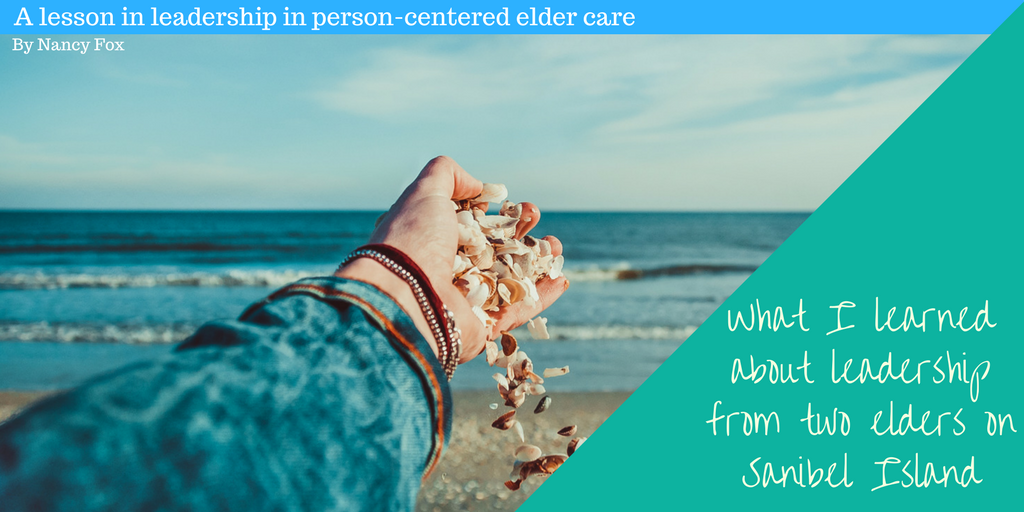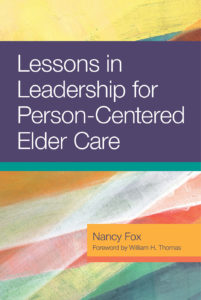
Author and Nursing Home Administrator, Nancy Fox, shares the moment she realized the reason many older adults fear nursing homes, and the two elders who showed her why.
Nancy Fox is a Nursing Home Administrator, former executive director of The Eden Alternative, and Chief Innovation Officer for Vivage Senior Living. She is also the author of Lessons in Leadership for Person-Centered Elder Care. Here, she shares a leadership lesson she learned while vacationing on Sanibel Island, after years spent transforming her organization into a person-centered care environment.
“She fell and can’t get up…”
In the summer of 2003, I took a trip with my partner, Sandy, to Sanibel Island, a tiny island in the Gulf of Mexico. As we were walking down a lane to the ocean, I noticed an elderly man standing by the edge of the road in front of a house. My elder-radar immediately went into effect, as I began surveying the scene ahead of me. This thin, frail gentleman must have been in his nineties. He was leaning shakily on a cane, and with his other hand at only waist height, he appeared to be calling us to him with his hand motions. He was unshaven and dressed in loose clothing. I approached him, smiling. He said something to me, but I could not make out what it was. Instinctively, I knew something was not right with this scene. I came closer. I had to put my ear next to his face to hear what he was saying.
“She fell and can’t get up.”
I knew immediately one of two things was happening here: there was someone hurt in the house, or this man was confused and should not be out by the street alone. Either scenario required our further investigation.
I asked, “Do you need some help?” He nodded. I then asked, “Do you need me to come inside with you?” He nodded again. I took his arm, and on our way in, he said, “No one would stop.” I reassured him that we were here now and would help.”
“There’s no one.”
As my foot hit the front steps of the house, I could hear her moans. We found her lying on the linoleum floor in front of the kitchen sink. She was crying in pain. My partner, Sandy, is a nurse, and immediately bent down to attend to her.
I dialed 911. As the phone was ringing, I looked at the man who was standing on the other side of the woman and asked him for his address. The woman answered, “107 Buttonwood Lane.” I asked the man, “What is your name?” Between moans, the woman answered, “Appleby. Abigail and Henry Appleby.” I relayed the information to the operator and requested an ambulance. Sandy was comforting the woman and trying to keep her still.
When I hung up, I asked if there was a son or daughter I could call. Abigail answered, “No.” I asked if there was a relative I could call. Through a cry of pain, Abigail answered again, “There’s no one.” I asked if there was a neighbor or friend to call. “No one,” came the reply. “How about a minister or other acquaintance?” I asked. “There’s no one,” she said. Those three words rang coldly in my heart.
Abigail had become incontinent either before or after her fall; a small pool of urine was beside her, the bottom of her housecoat soaked. Her cries continued. Abigail’s world had just collapsed in on her. Here was a 90-something-year-old woman caring for her husband, who was living with dementia. She was trying desperately to hang onto the life they had made together. And in the blink of an eye, in less time than it takes to wash a dirty coffee cup, that life just came crashing down. And there was no one to call.
“Then SHE burst into the room…”
The paramedics arrived with a stretcher. Two nice young men took over ministrations of Abigail. I sat next to Henry and reassured him that he would go with her to the hospital. Then SHE burst into the room with such force, it startled me.
She must have been all of 25 years old, but this EMT commanded everyone’s attention just by the way she entered the room. Cocky would be an understatement. She pushed the young men out of the way, bent down, and touched Abigail’s hip. Realizing that Abigail had become incontinent, the woman let loose the most degrading, “UGH!” I have ever heard. She then backed away and had the young men once again attend to Abigail. She made a call on her walkie-talkie and then she barked some orders to the young me.
I asked to speak with her, as she was obviously in charge. I told her that we were vacationing here and were just passing by when we saw Henry and came into the house to find Abigail. I informed her that we had inquired about relatives and friends, but there was no one to call. I then suggested she take Henry with them to the hospital. She looked over at Henry sitting quietly, staring at the young men working with Abigail. And then she said very loudly, loud enough for everyone in that room and the house next door to hear, “We are not babysitters!”
I said, ‘There are social workers at the hospital who can get Henry to a safe place.” Her response was, ‘They are not babysitters either.” I then pulled her aside, out of earshot, and told her that I was a nursing home administrator and had assessed the situation. It was obvious that Henry was living with dementia, and she was about to take his only caregiver with her in an ambulance.
She then asked me why I did not take him. I told her I wished I could, but if she had been listening the first time, she would know there is no one to call. I helped Henry to the ambulance, and off they went.
“Whatever you do, don’t put me in a nursing home.”
Sandy and I continued our walk to the beach, but I could not find solace there. I understood why Abigail was in so much pain. For the first time in my life, I got it. Their words kept resounding in my mind: “There is no one to call.”
The absolute disdain shown by the young woman whose job it was to care for people—how does that happen? When did our elders become invisible? And should they require some kind of help, when did it become appropriate to call them babies and sneer at their discomfort and the embarrassment of incontinence? Of all the beaches in the world, why did I walk down that lane on that day? My mind was reeling.
And then it hit me.
Through her cries of pain, Abigail showed me what I should have seen long ago. She showed me why people do not like nursing homes. I am a nursing home administrator. I know the kind of caring people that work in nursing homes. I know how hard they work and how much they adore their elders. Why, then, do more than 30% of seriously ill people say they would rather die than live in a nursing home?
Abigail and Henry showed me how an ageist culture was failing all of us. It certainly failed them. But it had also failed that young, insolent EMT. She, too, was suffering because we have lost our elders. I knew then that what we were fighting went far beyond the walls of the nursing home. It went to the farthest reaches of our nation, our world. The loss of our elders was hurting us all.
But this is not the only gift Abigail and Henry gave me that day.
“Bringing a message of hope…”
If you go to a provider association meeting or conference, you can discover all of the advancements in quality that have been made over the last 30–40 years. The mantra is quality—quality initiatives, quality measures, quality improvement, quality care. Nursing homes are highly regulated by governmental agencies in an effort to ensure safety, quality, and residents’ rights. If that is true, then why do our elders still say, “Whatever you do, don’t put me in a nursing home”?
In their decades-long quest for quality, nursing home providers and owners have failed to ask themselves an important question. Abigail and Henry showed me the right question. As Abigail lay on that cold, hard floor writhing in pain, I finally understood the question: What are they afraid of?
In that moment, I felt Abigail’s fear, and I knew the answer. And I cringed. I knew what was in store for them. I knew her fear in the deepest part of my soul. She was not afraid that she and Henry would not receive the best medical care available. That worry probably never crossed her mind. She was not afraid that Henry would not get his medications on time or three nutritionally sound meals and a snack per physician’s orders. She was not even worried that there would not be a van to take her to the grocery store. Abigail’s fear, and the fear of every other elder living in an ageist world, was the loss of her identity, security, autonomy, meaning, connectedness, growth, and joy. That fear was so great that it kept her and Henry isolated from their community, struggling to maintain their dignity and clinging to each other in a desperate battle against all odds—the odds of time.
I will never know what became of Abigail and Henry. But to this day, they and elders like them are why I work hard trying to share their wisdom with others. It is why I work to bring a message of hope rather than despair to our elders. For I know that what Abigail feared was a symptom of the institutional model of care. And I know that when we understand the power of community in a human life and work hard to transform our institutions into truly caring communities, then our elders will not need to fear anymore.
This post was adapted from Lessons in Leadership for Person-Centered Elder Care by Nancy Fox. Copyright © 2017 by Health Professions Press. All rights reserved.
Read the book!
Lessons in Leadership for Person-Centered Elder Care
by Nancy Fox
Copyright © 2017 by Health Professions Press, Inc.
Lead your organization to success in person-centered care, using these expert leadership and management lessons!

